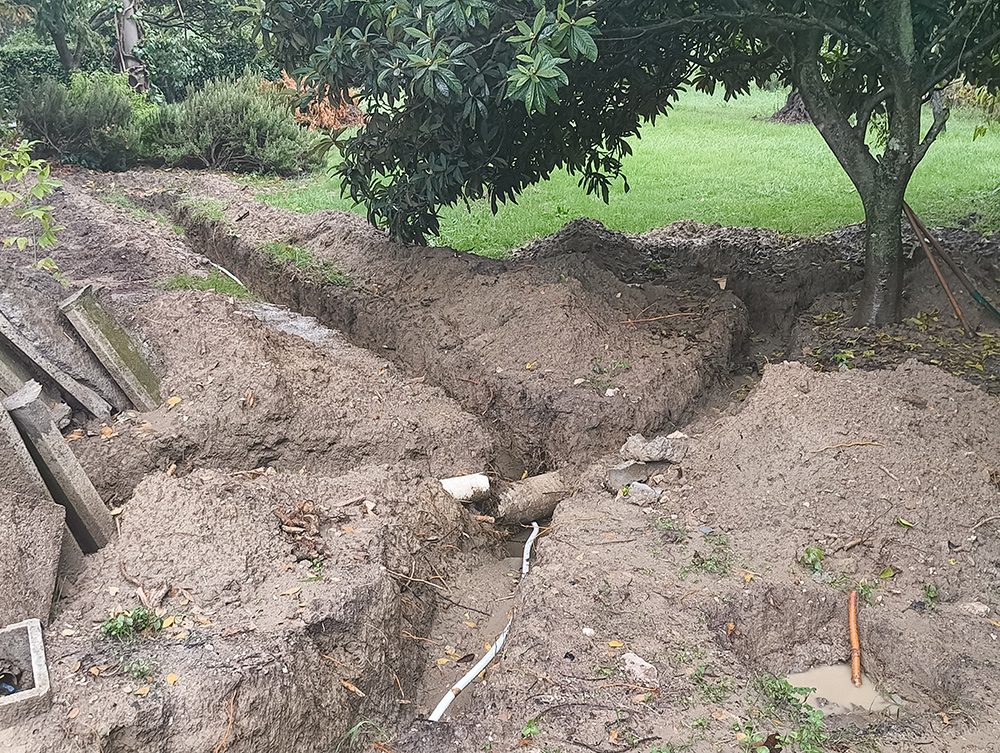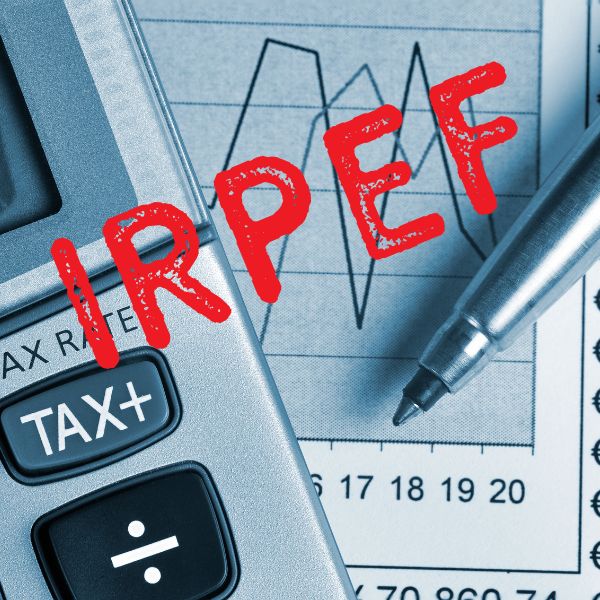Welcome to this E-zine once again. I thought I would share a few bits of news which have cropped up in the last week or so and which may interest you, non more so than a rearrangement of income tax rates in Italy from the 1st Jan 2025.
Income tax rates in Italy 2025
By Gareth Horsfall
This article is published on: 7th October 2024

But before I get into that I thought I would just give you an update on the house situation here in Umbria.
Thankfully all the major works have now been completed, the last of them being the installation of the new windows and persiane and the painting of the outside of the property. These were all finished last week (thankfully before some of the rains moved in). I also spent the last weekend in September digging a trench to run water pipes and a new electrics cable through.

It has been asked why I didn’t just get someone with an excavator to come and dig it, but we learned that there were a number of hidden pipes in the ground and cables which no-one knew exactly where they were positioned and so it was digging the old way – by hand. That was a big job, but now completed and once the new ‘impianti‘ are in place then I can have the enjoyment of filling the long trench back in again. The ‘idraulico‘ has nicknamed me ‘la talpa‘ for my efforts!
We are still living among boxes, but after the kitchen is finally fitted correctly (the first attempt was a complete mess! – Apparently they were not used to working with ‘wonky’ walls in old houses), then we should be able to move forward with unpacking and start to reassemble our home again. My son, Alexander is loving his new school, despite the 6 days a week and 40 min bus ride to school, so that makes everything much more easy to withstand. (They got a day off today on Thursday 3rd Oct due to high winds and torrential storms in the area!)
Anyway, I know many of you have been through similar experiences and much worse, so I finally feel like I understand your pain and despite all of this I am loving living among the olive trees, nature and the fresh air. I need to take some trips back to Rome regularly enough to see clients so I will get my city fix often enough.
So onto the new and interesting things which might affect you, the first is for everyone who is a resident in Italy.

IRPEF
From Jan 1st 2025 the IRPEF scaglioni (income tax bands) will be changing again. The government is following up on its promise at the elections to modernise the taxation system and move to simpler and more ‘interesting’ tax bands.
Giancarlo Giorgetti (Finance Minister) said ‘ We are committed to not only cutting the tax rates and reducing the 3 tax bands, but also realising them from the next tax year [2025]’
So, the current and proposed (but not yet confirmed) IRPEF rates for 2024 and 2025 respectively are as follows:
| 2024 | Tax rate% | 2025 |
| € 0 - 28000 | 23% | 23% |
| €28000 - 55000 | 35% | 33% |
| €55000+ | 43% | Here they will likely leave the rate at 43% but instead increase the band to income over €60000 |
Now, let’s be honest, I don’t think this is going to affect many of us in any significant way, however, it might mean some savings here and there. So not to be sniffed at!!
But, you might ask why they don’t amend the first income tax bracket to make it more attractive to lower earners?
From submitted tax returns completed in 2023 we learn that 40% of 42 million taxpayers declare less than €15000 per annum in Italy and 70% of all taxpayers pay less than 20% in tax (after deductions). In 2023, the declared average income from calendar year 2022 was €22806. So given the majority of Italy’s income tax take comes from the bottom income tax bracket, it is unlikely that they will start tweaking with that any time soon, in my opinion.
However, all will be revealed in the ‘Legge di Bilancio‘ (Budget) in Jan 2025, as usual!

The UK Budget
The UK autumn budget will be taking place on October 30th this year and there are some interesting changes afoot. As yet, nothing confirmed until the big day, but I attended a couple of online seminars looking at possible tax changes that could turn out to be quite interesting ( positive and negative) for any Brit’s looking to move to Italy and become long-term residents, or those of us who are already here.
Let’s start with the positives:
Inheritance Tax Overhaul
The UK inheritance tax system has always been determined by a UK person’s domicile. This always meant that the UK could wield the right to tax the estate of a UK national, even where they may have lived abroad for many years.
The classic tale regarding this situation is the story about the actor Richard Burton. I have told this story before on my E-zine, but the story goes that he was born in Wales (UK) but got into the movies and became very famous and moved to the USA, earned his money there and transferred his whole life to the US owning no more assets in the UK. On his death the UK, under the domicile rules, reserve the right to tax the estate where there are significant ties back to the UK. In Richard Burton’s case he ‘supposedly’ (I have never researched whether this is true or not, but it’s a good story anyway), wrote in his last will and testament that he wished to be buried in the Welsh cemetery where he grew up. Apparently, this was considered a sufficient tie back to the UK and the UK HMRC taxed his entire worldwide estate. I am not sure if this story is true but it does go to demonstrate the lengths to which the domicile system can come knocking, should the UK tax authorities wish to do so.
However, the talk on the street is that from October 30th the UK will move to a residency based test for inheritance tax purposes. So what does this mean?
In brief, the proposal is to allow any UK national who has lived away from the UK for more than 10 years to be able to have their estate taxed in their country of residence at the time of death (but with the UK government reserving the right to tax the state for a further 10 years should they wish to do so). This presents a HUGE financial planning opportunity for residents of Italy, as I shall discuss below.
If your intention is to live and die in Italy then Italian IHT rates are so low that it could be classed as a fiscal paradise for inheritance tax purposes. I won’t go into details, but just to say that direct line descendants (spouse and kids) all get a €1million allowance before they would pay tax at just 4%. Compared to the UK’s 40% on estate value over £325,000 (plus the possibility of main residence relief), the Italian system is much more attractive.
However, if you have invested assets (not real estate!) which you would like to protect from inheritance tax altogether, then you can potentially invest in an Italian polizza assicurativa (Investment Bond) which protects all assets within it from any inheritance in Italy, so effectively reducing your IHT bill to zero.
What a planning opportunity
I am not sure the UK government had this little tax opportunity in mind when thinking about the change but for UK nationals who are long term residents in Italy and who want to live out the rest of their lives here, this represents a great financial planning opportunity.
And here come the negatives:

Gifts for Inheritance tax purposes
There is talk of removing the gift tax break known as PET’s (Potentially exempt transfers) where a gift made, after a 7 year period, is no longer considered in the inheritance tax calculation. May they remove this? It might be a good time to discuss with family members, who may want to gift you funds, to do this before October 30th before the rule would likely come into force.
There is also the question of money being paid to a non-resident individual and whether that could attract a UK exit charge (see Potential exit charge for UK nationals section below)
Capital Gains Tax increase
For anyone holding onto UK property assets and thinking of selling them you may want to watch carefully what happens with capital gains tax rates in the UK post 30th October 2024.They are expected to be increased; currently at 18% and 24% for residential property, they are likely to increase and the change be effective immediately!
Remember that as a non-UK resident UK property owner, if you sell the property then you are subject to UK CGT on the proceeds. If you have owned the property before 2015 (when the law came into effect) then the cost (purchase) basis for your property is 6th April 2015. If purchased after then the purchase value in the contract is the cost basis for capital gains tax purposes.
If you have owned the property/ies for more than 5 years then Italy will not deem them speculative and will not tax you on them.

Potential exit charge for UK nationals….and maybe UK located assets?
I have to say that this one surprised me, and as of yet I haven’t heard anything more about it, but the jungle drums are beating that there may be a possible exit charge on anyone who becomes UK non-resident.
A tax of this nature is currently applied to UK trusts who become non-UK resident. A deemed disposal value of the assets is made just before the moment of non-residency and a subsequent deemed re-acquisition of the same assets at market value is made for the purposes of calculating the CGT.
Here we are faced with a clear financial planning necessity because if you are invested in tax efficient vehicles (ISA’s) in the UK then it would make sense to cash them in and pay no capital gains tax on them in the UK whilst still a UK resident, and then leave them in cash (no capital gains tax on cash!) whilst you transition over to your new residency in Italy and reinvest from there. However, if a tax is levied on capital rather than assets then it may not be avoided. How the UK HMRC will do this is anyone’s guess but should this be introduced then financial planning before the move for UK resident individuals will be very important.
The bigger question is what they might do with already non-UK resident individuals who have assets still situated in the UK? Tax on transfers overseas?
Whatever law is likely to be announced will probably come into effect from April 6th 2025, so there may be time to plan, but it might be time to look at how to remove some or all of your assets (depending on your circumstances) from the UK and potentially avoiding any exit taxes.
I would repeat that this has come as a bit of a shock, but does not surprise me given the UK’s current economic difficulties. Putting in measures to avoid flight of capital overseas would not surprise me and has been bounded about as an idea in the past by a Conservative government. Will Labour finally follow through with these more draconian measures? We will soon find out.

Pension tax free lump sums
As anyone with a UK pension will know you are currently eligible to withdraw 25% of the valuation of the pension at age 55 (moving to age 58). The possibility is that this will be reduced to a maximum of £100,000 for all pensions and will likely be effective immediately.
As a reminder to anyone thinking of moving to Italy, it is always better to take the tax free lump sum in the UK before moving to Italy because Italy does not respect this tax break and would tax the whole amount as income. However, in light of this new UK proposal you might want to accelerate your decision to remove your full 25% before October 30th and hold it in cash/deposit, before you make your move to Italy.
Surcharge for non-resident buyers of UK property.
Here we have a tax increase for anyone who may be non-UK resident at the time of buying UK property. The surcharge may increase from 2% to 3%.
At the moment we don’t know any specifics and so I can only relay that which I have heard on 2 different tax seminars specifically on this topic. Some of these proposals may rightly cause some level of immediate concern and others maybe there is the opportunity to wait. At this point, if I hear anything else I will report on it straight away but I imagine that the next time will be Budget day itself.
If you would like to discuss these or any other tax or financial planning related issues in Italy then please don’t hesitate to contact me on gareth.horsfall@spectrum-ifa.com or call / message on +39 3336492356
Always happy to help where I can!
Financial update France October 24
By Katriona Murray-Platon
This article is published on: 5th October 2024

As we head into October, this means that we are now three quarters of the way into 2024. When we look at the markets we can see that in spite of a short dip in August, the year to date figures for almost all of the main market indices are showing performances in the double figures.
Autumn is the season for what are known as local taxes, i.e. the taxe foncière, taxe d’habitation and tax on vacant lodgings. Whilst the taxe d’habitation only affects those with second homes, taxe foncière has to be paid by all property owners. Properties that are inhabitable but remain vacant, which are situated in one of the 3697 communes listed in the decree number 2023-822 of 25.08.23 and which have been left unoccupied for at least a year as at 1st January of the tax year may be subject to the annual tax on vacant lodgings. For a property to be liable for this tax in 2024 it must have been empty since 1st January 2023. If it has been vacant for 2 years since 1st January 2022 there may be a local tax on vacant lodgings which may apply.
The Taxe Foncière statement should already be available in your account on the impots website. This must be paid by 15th October or you have until 20th October if you pay online. It doesn’t need to be paid all at once, you can set up monthly payments so that by the time October comes along you will have paid most of it with the extra amount being paid in November. Whilst the Taxe Foncière will increase again this year, not everyone has to pay it. Those on benefits (ASPA, ASI) are exempt as are those who are aged 75 or over on 1st January of the tax year and those on disability allowance (AAH) provided that their annual taxable income is under €12,455 per person or €19,107 for a couple. If you fall under the income threshold and are over 65 on 1st January there is a €100 reduction. There is no need to notify the tax offices, any exemptions or reductions will apply automatically provided that you meet the income conditions. However there may be extra allowances granted by your local authority so it is worth making enquiries.

The housing market in France is improving in spite of a difficult first half of the year. As several of the main central banks have started cutting their rates, the mortgage rates are also falling. According to our Spectrum International Mortgages expert Patricia Nadal, the average rate over 20 to 25 years granted in September was around 4.30%, compared to the average of rate for the same length of time in June which was around 4.45%.
The banks are also being more flexible in their requirements for granting mortgages. In the UK even though the Bank of England voted to keep their rate at 5%, mortgage rates have fallen to 4% with some just under this rate.
From 24th October 2024, anyone opening a new French assurance vie or PER will now have the possibility of investing in venture capital investment funds. These are only for those with a balanced risk profile (around 4% of the investment) and adventurous profiles (up to 8% of the assets). There is no obligation to invest in such funds for cautious profiles. For PERs it will depend on the attitude to risk of the policy holder and how long they have until retirement. Also, from the same date, if you have a PER they will now be able to offer more adventurous investment strategies.
Although the weather may be getting cooler and you want to spend more time indoors, if you have any financial questions you would like answering, I would be happy to arrange a video call or I could come and meet you in the comfort of your own homes. Please do get in touch to arrange a time that would suit you best.
Five Essential Rules for Drawing on Your Investments and Pension
By Portugal team
This article is published on: 4th October 2024

After years, or even decades, of building up your pension and investments, you eventually reach the point where you want to start drawing from these savings. This marks the transition from the accumulation phase of your financial life to the decumulation phase.
Navigating this phase effectively can make a significant difference to your financial well-being and your legacy. Below, we outline five key rules to help ensure that your withdrawals are both tax-efficient and investment-savvy.
1. Only withdraw your lump sum if necessary
Under UK pension rules, you can withdraw 25% of your pension fund tax-free. This is known as the “Pension Commencement Lump Sum.” Whilst this payment is tax free for UK residents, those living in Portugal must report and pay tax (unless 0% NHR) on this sum.
If you have a specific plan for this money, such as paying off a mortgage or clearing other debts, withdrawing the lump sum may be a wise choice. However, if you don’t have an immediate need for it, it might be better to leave the funds in your pension, where they can continue growing tax-free.
Another key consideration is inheritance tax (IHT). Currently, pension funds are exempt from UK IHT. By taking money out of your pension, you may unintentionally move it into your taxable estate. This is fine if you plan to spend the funds, but it could be inefficient if you are simply holding on to or reinvesting the cash.
2. Dynamic withdrawals
When withdrawing from your investments, striking the right balance between enjoying your lifestyle now and securing your financial future is crucial. Some people prefer to prioritize their current lifestyle, while others aim to leave a larger estate for their beneficiaries.
Market conditions should also influence your decisions. For instance, if stock markets have risen, it might be wise to take profits. Conversely, during market downturns, you might choose to reduce your withdrawals until conditions improve.
Cashflow planning can also help you plan for the future. Forecasting allows you to balance your spending today with the need to preserve funds for the future. It also allows you to adjust for variables like inflation, market performance, and unexpected expenses, helping to prevent the risk of outliving your savings while maintaining your desired lifestyle.
3. Plan for the long haul
Many people underestimate their life expectancy when planning for retirement. A couple in their mid-60s today has a good chance of living well into their 80s or even beyond 100. This means it is important to plan (and think in) decades rather than just a few years.
This increased longevity has important implications for how one should invest. In the past when life expectancy was much shorter, retirees often moved their portfolios into lower-risk assets like bonds or cash but with people living longer, this approach is no longer be suitable.
To ensure long-term growth, it’s essential to maintain a healthy allocation of growth-oriented assets such as shares, while balancing this with safer investments like fixed income and cash. The exact mix will depend on your risk tolerance and other income sources.
4. Review Your Plan Regularly
Global markets and tax laws are constantly changing, which is why it is crucial to review your portfolio regularly against this ever-changing backdrop.
This includes keeping up with changes in tax laws across multiple jurisdictions, for example UK pensions has seen huge changes recently and further changes are expected in the next UK Budget. Adapting to new rules in both the UK and Portugal, can help you avoid costly mistakes and optimise your financial strategy.
5. Control Fees and Taxes
While you can not control market movements, you can manage two major eroders of wealth: taxes and fees.
People often end up paying tax in the wrong country or, worse, in multiple countries at once. Additionally, many fail to take advantage of the tax reliefs and allowances available to them.
Regularly reviewing your financial arrangements can help ensure that your investments and pensions are tax-efficient and that you are not overpaying in fees.
Final word
By following these five rules, you can better navigate the transition to decumulation, ensuring that your hard-earned savings continue to work for you in a tax-efficient and financially secure way.
Moving to Portugal Show & Seminars
By Portugal team
This article is published on: 3rd October 2024

LONDON, THURSDAY 17TH OCTOBER
Pestana Chelsea Bridge Hotel
354 Queenstown Road London SW11 8AE
Escape the ordinary, embrace the extraordinary, and discover why Portugal is the perfect present for your future.
On Thursday 17th of October 2024, our Moving to Portugal Show & Seminars will return to central London. This one day event, which opens at 10.30am and closes at 7.30pm, mixes live seminar presentations and expert panel discussions with carefully selected exhibitors, who can give you all the information you need on how to make your business or lifestyle move to Portugal a success from day one.
You can learn all about the different visa, residency and tax rules, and how daily life works in terms of jobs, schools, health and the cost of living. You can also learn about investing in Portugal, from the managers of some of the country’s top investment funds who will explain their investment strategies and why some funds are eligible for Portugal’s well known ‘residency by investment’ Golden Visa programme.
If it’s a quiet life you want, come and find out why retiring to Portugal makes good financial sense.
Come and meet our very own team of experts who live and work in Portugal – this means they understand exactly what its like to move to another country. Are team will be presenting and sharing valuable insights on maximising pensions, investments, and estate planning in Portugal.
We are also encouraging the in-person visitors on the day to book one to one meetings in advance with our advisers, or to book a Zoom call or video call with them if you prefer not to attend in person.
Contact our team direct to book your appointment: portugal@spectrum-ifa.com
Did you miss out on NHR? You could still be eligible
By Portugal team
This article is published on: 2nd October 2024

GOOD NEWS !
Many expats who were eligible for NHR status didn’t apply—either because they weren’t aware of the program or received incorrect advice—resulting in unnecessary tax payments.
Following a recent ruling from Portugal’s Supreme Administration Court, it may still be possible to apply for Non-Habitual Residence (NHR) status – even if you missed the initial deadline.
The detail
To qualify for NHR status, one of the key requirements is that you must not have been a tax resident in Portugal for the five years preceding your arrival and application.
Traditionally, the deadline for NHR applications is 31st March in the year following the start of your tax residency e.g. if you became resident on 1st June 2017, the application deadline was 31st March 2018.
As a result of this ruling, if you were eligible at the time of arrival in Portugal you may still apply for NHR, although the NHR period will start from your original residency date i.e. if you became tax resident on 1st June 2017, the end date of NHR will be 2026.
NHR – a taxation no brainer
To recap, the benefits of NHR lasts 10 years and offers:
- 0% tax on foreign dividends and interest
- 0% tax on capital gains from non-Portuguese property
- 10% income tax on foreign pensions
- 20% tax on income from “high-value” professional activities
These benefits make NHR one of the most attractive tax regimes in Europe. If you’re eligible under this new ruling, it is highly advisable to consult with your lawyer or accountant to review your status and potentially apply.
If you need any assistance in evaluating your investment and pension planning in light of NHR, we would be pleased to assist.
Are trusts right for you and your family
By Portugal team
This article is published on: 1st October 2024

In previous articles, we explored Qualifying Non-UK Pensions and Portuguese-compliant investment bonds as potential investment strategies. This week, we turn our attention to another important financial planning tool—trusts. In this article, we will discuss the advantages and drawbacks of using trust structures to manage investments.
Please note that the following analysis assumes UK domicile and it is important to understand that you can have a UK domicile as a Portuguese tax resident.
What is a trust?
A trust is a legal arrangement in which ownership of assets—such as cash, property, or investments—is transferred from one individual (the settlor) to trustees. These trustees then become the legal owners of the assets, managing them for the benefit of the settlor’s chosen beneficiaries.
A typical example might involve parents or grandparents aiming to reduce the size of their estate for inheritance tax (IHT) purposes. However, they may not feel comfortable gifting directly at this stage due to, for example, the beneficiaries being minors or not being mature enough to receive gifts direct. So the trust allows them to gift the assets now, but retain control over the timing and distribution of assets to the beneficiaries.
Trusts may also be used to safeguard assets for vulnerable beneficiaries or protect family wealth in the event of divorce.
Trusts can be created during a person’s lifetime or incorporated into a will.
Benefits
One of the key advantages of a trust is the control it offers. The settlor can dictate when and how assets are distributed to beneficiaries, which is particularly useful if the beneficiaries are not ready to manage large sums of money.
In addition to control, trusts offer substantial IHT benefits. Once assets are placed into trust, they are removed from the settlor’s estate, potentially resulting in a 40% tax saving—provided the settlor survives for seven years following the gift. This can significantly reduce the tax burden on beneficiaries when the settlor passes away.
Another practical benefit is that assets held in trust bypass probate, which can speed up the process of settling an estate and distributing assets to beneficiaries.

When is a trust most effective?
A trust is most effective when the settlor does not need access to the assets or income from the trust.
If the settlor or spouse retains any benefit from the assets within the trust, this is treated as a “gift with reservation of benefit” (GWR or GROB) meaning that the value they thought they had given away actually remains in their estate for tax purposes.
We commonly see parents gifting their main home to their children, or to a trust though which their children can benefit, thinking that this gift removes the value of their home from their estate on the basis they are no longer the legal owners. However, by continuing to live in the property they have fallen foul of the GWR rules and have defeated the purpose of the planning.
Tax implications
While trusts can deliver IHT savings and offer control over asset distribution, they can be quite costly from a tax perspective.
Upon creating a trust, the settlor must pay a 20% IHT charge on any amount exceeding the available nil-rate band (£325,000 for the 2024/25 tax year). For example, a £1 million gift into trust would result in a tax bill of £135,000 on the excess £675,000.
If the gift involves non-cash assets, capital gains tax (CGT) may apply, as the transfer is treated as a disposal.
Lastly, trusts are effectively additional rate taxpayers in the UK. They therefore pay income and capital gains tax at the highest rates on any income received and gains made annually. The trust also pays an inheritance tax charge of 6% every 10 years on the trust value.
Trusts and Portuguese Law
As a civil law jurisdiction, Portugal does not recognise trusts legally but it does tax income deriving from trusts and this applies irrespective of whether the trust has increased in value or not i.e. any distributions would be taxed at 28%, or at 35% if coming from a blacklisted jurisdiction, on both capital and gains.
Alternatives to trusts
If trusts are expensive from a tax perspective, not to mention the costs of appointing and running trustees, what at the alternatives?
‘Bare’ trusts
These are simpler than discretionary trusts and do not carry the 20% entry or 6% periodic tax charges. However, bare trusts have a significant limitation: once the beneficiary turns 18, they automatically gain full access to the assets, which may not be suitable for every family.
Contract based solutions
There are financial products that offer similar benefits to trusts—such as “gifting with control”—without the hefty tax costs associated with trusts. These may be worth exploring as an alternative.
Conclusion
There is no “right” or “wrong” in relation to trust planning – the suitability of different trust options will really depend on each family’s position and objectives.
For example, if you need access to either the capital or income from the underlying assets, trusts may not be appropriate. Or if you are uncomfortable gifting directly to your beneficiaries now, then a trust may be a redundant step in the financial planning process, and it may be better to consider various ways and allowances for making direct gits to your beneficiaries.
We would also advise a word of caution against companies cold-calling offering trust solutions to “Labour proof” your finances, and to always ensure you use caution and do your due diligence.
Why have a Financial Adviser?
By Susan Worthington
This article is published on: 21st September 2024

Change is inevitable, for many it can be unsettling. I am fortunate in that the clients and friends I look after have remained happy to stay with me on their financial journeys. Sometimes that journey can be more expensive than looking after your own affairs but at the end of the day it ensures your wishes are carried out to the best of your intentions.
It makes one appreciate that a client’s commitment to their adviser for the duration of their financial arrangements is fundamental to developing a strong relationship and achieving successful outcomes. It’s what an adviser can help them with that matters, and supporting those requirements over the long-term creates a unique bond. Matching the actual advice and arrangements to a client’s needs should be the highest priority for any adviser.
So what can an Adviser provide:
• Helps maintain perspective (and calm or change) during stock market turbulence.
• Able to explain and problem solve when something goes wrong.
• They provide more accurate news and updates from the real experts, steering clear of the media hype and scaremongering that is everywhere.
• Recommend tax efficient arrangements geared to your lifetime and also very importantly, after it, for your family.
• Have access to investment fund experts who often fare better than self-selected choices.
• Keep you on track as your circumstances change. Nothing ever stays the same, part of life’s rich pattern, so having a hand to hold you through that change can be comforting and supportive.
• Liaise with your tax or legal advisers to ensure your overall interests are protected.
As I reach a period in my work that extends to several decades sadly that involves clients leaving this world for the other and that alone can create enormous problems. If the next of kin are not aware of what to do, of what is required from them or where to seek advice it becomes overwhelming.
When you have friends and clients who have connected with you for many years it is often the financial adviser who can assist in this “miserable” but essential exercise. Most often once affairs are put into order during your lifetime, for those left behind, it provides a huge sense of relief.
Even in my own planning I have to consider working with other Advisers so that the increasing number of clients we look after will be managed effectively for the longer term, in case I disappear on my journey one day.
Most people will benefit from the knowledge and experience of a professional financial adviser, especially if they have a variety of assets. When deciding between working with a financial adviser or doing it yourself, you just need to weigh the benefits against what you could be missing out on.
Finance in Italy
By Gareth Horsfall
This article is published on: 16th September 2024

I have been rather absent this summer mainly due to my change of residence from Rome to Umbria. Works are still going on at the house although now in their final stages and should be done by the end of Sept, which I will be very thankful for because quite frankly it’s all driving me a bit mad.
Then of course, the work of getting the house and land in order will start and which will be much longer term. I still haven’t a clue what to do with the olive harvest, although after taking a tour of the trees the other day and given the very long hot dry summer this year plus the fact that the trees themselves have not been trimmed well in many years, it looks like the harvest would not be so great anyway, save a few trees which have produced quite a bit of fruit.
So all in all I am less preoccupied with that now and I may even take a weekend to have a go myself and see what happens… there is always a first time for everything! 😉
Saying all this, the thing that is driving me more mad is the fact that my long term rental car has now been playing up for over a year and I have had it in with the mechanic 6 times (yes, that number is correct !!) and every time within 48 hours the same problem arises. I am now going mad with LeasePlan about getting another car to which I cannot be promised a similar vehicle (which I need given the amount of Kms I do and also the types of ‘strade‘ I have to drive along). I think this fight is actually ageing me a lot more than the house renovations. Being without a car which functions properly is incredibly stressful.
Anyway, enough of my travails. Let’s talk financial stuff.

From €100,000 to €200,000
Firstly, a small mention of something that cropped up during the summer, and is unlikely to affect many of us, but Italy currently has a flat tax regime for high net worth individuals (did you know that by definition high net worth starts at €/$/£ 1 million of assets exc home?). In brief, there is the opportunity for those HNW individuals who wish to transfer their residency to Italy to pay a flat tax of €100,000 a year for a maximum of 10 years without the need to enter into the general tax system. This forfeit regime usually works out best for anyone who is earning a high enough income and would be paying over this amount in income tax. For anyone with invested assets, generally speaking, they could be organised in a way to not get anywhere near €100,000 in taxation, depending on factors such as how much one might need to spend each year etc.
Anyway, my point was that the Italian authorities have chosen to increase this flat tax to €200,000 pa. for new applicants (the effective date is not clear yet).
The interesting point about this was not the increase itself but the wording used by the Minister for Economy and Finance: Giancarlo Giorgetti. He stated:
“We [Italy] are against any type of competition to create the most advantageous fiscal regime for businesses or individuals, because countries, like Italy, that have a limited fiscal capacity would be disadvantaged and destined to lose”
From my point of view these are quite interesting words especially since Italy is now trailing other countries in the EU (Portugal) and the UK in pulling their fiscally advantageous tax regimes for high net worth individuals. So, is it only a matter of time before this flat tax regime is stopped altogether? I suspect it is.
Italy also has a flat tax regime for retirees moving to one of the southern regions in Italy. The possibility to pay a flat tax of 7% pa for a maximum of 10 years (with conditions!) Has this flat tax regime also got a ‘data di scadenza’? Only time will tell but certainly the direction would appear to be that preferential tax regimes are likely to have a limited shelf life, so if you are hoping to apply then it might be best to think about doing so sooner rather than later.
Other than this I didn’t really see anything other than the norm this summer. Financial markets have performed quite well this year to date, albeit more volatile in the summer months. I will be reporting more on that in further E-zines, but for now I wanted to share with you something I listened to on a podcast one day when I was ‘working the land’ one happy day in August. This topic rang true as we are now most of the way through a year when nearly 70% of the worlds population will have voted for new political leaders and the most important one is yet to come: the USA.
But I ask you to think about the following discussion I had with my mother in law recently when she explained to me that she had stopped buying goods from Amazon because she felt like she was funding big multinationals in their continued effort to destroy small businesses and making it harder for anyone else to compete in a fair market place. Whilst I admired her conviction, and actually agree with her 100%,I disagreed that Amazon were the actual proponents of this strategy and were in fact just a business trying to maximise profits and would use whatever legal methods (and probably use lobby groups as well) available to them to achieve that aim and if Amazon were in fact paying the same level of taxes and contributions as a small business owner then it would be much more likely that Amazon would have difficulty in continuing in its present form and small business / retail etc would perhaps thrive again. My point being that whilst purchasing less from Amazon will undoubtedly help your local businesses (and I do purchase more from local businesses than Amazon), it is unlikely to solve the wider problem as it is a political one which must be addressed.

So, whilst I was listening to this podcast there was a man called Lloyd Chapman speaking and he is the founder of the American Small Business League and had some pretty interesting things to say about small business in the USA.
I imagine that the facts and figures are roughly the same in the EU as those he quoted for the USA, but they did make me think twice about my own consumer patterns, which also leads us to our own investor behaviour.
So let me give you some of those interesting facts now.
How important are small businesses to the US economy?
* 99% of all US companies have less than 5 employees.
* 98% have less than 100 employees
* The average US company has just 10 employees.
* There are 33 million small businesses in the USA.
* Most of the innovation and R&D breakthroughs in the US come from small business.
These very same companies are responsible for over half the USA annual Gross domestic product, half of the private sector workforce, over 90% of the US exports and hence are responsible for over 98% of all new US jobs.
MOST AMERICANS WORK IN SMALL BUSINESSES
Bias of Government
Lloyd went on to point out that the federal government (and I would argue the European governments too) is all for big business. They introduced the small business act in 1953 which mandated that 23% of all federal contracts should go to small businesses, of which 5% would go to women owned businesses, 13% to businesses run by minority groups, and 5% to small businesses run and owned by Veterans. On this basis the small business act looks like the largest economic stimulus programme ever passed by Congress for the American people.
However, given that the majority of federal contracts are awarded to the Pentagon you would imagine that there would be a lot of auxiliary businesses providing services to the Pentagon itself, however, Lloyd explained that this is not the case and the small business act of 1953 has been largely repealed by the Pentagon over the last 20 years. In fact, the US government has, for the last 30 years, undergone a non-stop effort to close small business administration (local support offices for small businesses) and end all federal programmes for small businesses.
* Only 1% of businesses in the USA have over 500 employees
* But over 97% of federal spending goes to less than 1% of companies in the US.
* That 1% of federal spending has not created 1 NET new job in over 40 years (since the 1980’s) and dozens of these companies are not even paying taxes. The majority are Fortune 500 companies.
This is, in the words of Lloyd, a recipe for economic suicide.
Portuguese compliant investment bonds
By Portugal team
This article is published on: 15th September 2024

A path to lower taxes?
In an increasingly complex financial landscape, Portuguese tax residents are constantly on the lookout for investment strategies that offer both flexibility and tax efficiency. One of the most tax certain options for investors looking to reduce their tax burden is the Portuguese Compliant Investment Bonds (PCIB).
What is a PCIB?
PCIBs are a tax efficient form of investment that work particularly well for residents of Portugal. They also offer enhanced tax advantages for those who may return to the UK in the future.
Despite the somewhat misleading name, these “bonds” are not traditional loans to corporations or governments. Instead, a PCIB operates as a tax-efficient “wrapper,” akin to the UK’s Individual Savings Accounts (ISAs), offering investors a protective layer against immediate tax obligations.
How they function
The actual performance and growth of the PCIB is driven by what you put into the wrapper and in this respect, it is very flexible.
The PCIB allows you to invest in a wide choice of investments without the tax drag of ongoing capital gains or income tax – this is referred to as “gross roll up”. This means that within the PCIB, investments can accumulate wealth more rapidly than if they were subject to annual taxation outside of this structure.

A Strategic Move for Homeowners
One of the standout features of PCIBs is their potential to reduce or eliminate capital gains tax when selling property in Portugal.
Unlike in the UK, where selling a primary residence often incurs no tax, Portugal applies capital gains tax to all property sales. Historically, the only means to avoid this tax was to reinvest in another EU property—a strategy rendered moot for UK properties post-Brexit.
However, in 2019, the Portuguese government introduced a concession allowing individuals to bypass this tax by investing the proceeds from a property sale into an approved investment or pension structure, such as a PCIB. There are however certain qualifying conditions, the main ones being age 65+ or retired, the property being sold must be your main residence, and it has to be held by you personally (not through a company).
Other benefits
PCIBs offer a range of benefits beyond property-related tax relief:
- Lower Effective Tax Rates: When funds are withdrawn, only the growth portion is subject to tax. Additional tax reductions apply after five and eight years.
- Post-NHR Flexibility: The favourable tax treatment of PCIBs is available to both Non-Habitual Residents (NHR) and regular Portuguese taxpayers, making them a versatile tool for long-term financial planning.
- Control Over Tax Timing: PCIB holders can choose when to withdraw funds, enabling them to synchronize taxable events with periods of lower income.
- Avoid the 53%+ capital gains tax trap – investments held for less than 12 months typically attract income tax rates of up to 53%. However, within a PCIB, buying and selling can occur without triggering immediate tax liabilities.
- Investment flexibility and diversification – PCIBs accommodate a variety of currencies, asset classes, and investment strategies, offering a broad scope for portfolio diversification.
- Simplified Tax Reporting: Tax and reporting obligations are only triggered when a withdrawal is made therefore simplifying the reporting process for bond holders.
- International Portability: Recognised in many jurisdictions, PCIBs offer flexibility for those who may relocate, potentially eliminating the need to liquidate investments to start planning again. They are particularly tax efficient for UK residents allowing investors to potentially washout gains made whilst overseas.
- Succession planning – investment bonds allow flexible and certain transfer of wealth to beneficiaries. This may not be possible with other investment types and the default “forced heirship” provisions under Portuguese law.
- Inheritance tax savings – with the correct planning, holding wealth in an investment bond could mitigate UK inheritance for British domiciles and strengthen a non-UK domicile claim.
- Estate administration – In the event of the bondholder’s death, the distribution of assets to beneficiaries can occur without the need for a lengthy probate process.
The Importance of Professional Guidance
Given the intricacies involved in setting up a PCIB, it is essential to seek expert advice. Properly structuring the investment to align with individual and family needs is crucial to maximising its benefits and ensuring compliance with applicable laws.
How to Labour proof your finances
By Portugal team
This article is published on: 14th September 2024

No matter where you stand on the political spectrum, it seems there may be difficult times ahead regarding the UK’s finances.
With the upcoming budget on 30th October, tax increases seem all but certain.
The dilemma for the government is that, with Labour’s pledge not to raise income tax, national insurance, VAT or corporation tax, how will they look to ‘plug the hole’?The dilemma for the government is that, with Labour’s pledge not to raise income tax, national insurance, VAT or corporation tax, how will they look to ‘plug the hole’?
Here are some key areas to consider, the implications of which will be determined by your tax residency status, UK or Portugal.
Capital Gains Tax (CGT)
Currently, non-property gains are taxed at 10% for basic-rate taxpayers and 20% for higher/additional rate taxpayers, and property gains are taxed at 18% or 28%. One potential change could see CGT rates aligned with UK income tax rates i.e. 20%, 40% or 45%.
Whilst this will not have an impact to gains made by expatriates on non-property related investments, as the gain is only taxable in the country of resident (28% in Portugal), it would impact gains made on property held by non-UK residents.
UK property is always primarily taxable in the UK, irrespective of where the owner is resident. For Portuguese tax resident selling UK property, tax is also due in Portugal on the gain with a credit for any tax paid in the UK (unless a Non-Habitual Resident, where the gain is taxed at 0% in Portugal).
Pension Schemes
Changes to pensions would impact both UK and Portuguese tax residents. Currently, pension schemes are exempt from inheritance tax (IHT), but this benefit could be reduced or eliminated. Additionally, there may be changes to tax relief on pension contributions, so now could be a good time to maximise contributions and unused allowances while full relief is still available.
Keir Starmer has confirmed that there are no plans to reintroduce the lifetime allowance (LTA), but he has pledged a pension review.
This could see the tax-free Lump Sum Allowance (LSA) reduced or removed, so those needing this cash could benefit from withdrawing it sooner rather than later.
There may also be a reduction in the tax relief on pension contributions for high earners, reducing the relief from 45% to 20%/25%.
Whilst currently, pensions are outside the scope of UK inheritance tax, there has also been talk of removing this benefit. So those with large pension pots should keep an eye on these changes.

Inheritance Tax (IHT)
IHT changes are likely to impact UK nationals, regardless of residency, since IHT liability is determined by domicile status, not residency. Therefore, even if you have lived in Portugal for many years, you may still face UK IHT if you have not taken the necessary steps to shed a UK domicile of origin.
It is likely that any foreign assets held in offshore trusts will be liable to IHT.
Possible further changes include reducing the generosity of agricultural and business property reliefs, as well as extending IHT to pension schemes.
Early planning is crucial with IHT, such as starting the seven-year gifting period and taking advantage of the annual available reliefs.
For those looking to adopt a domicile of choice in Portugal, it would be beneficial to reduce your UK-based assets, as they remain subject to UK IHT, even if you are domiciled abroad.
Other changes
Possible further changes include reducing the generosity of agricultural and business property reliefs, and “wealth tax” targeting high-net-worth individuals e.g. through increased taxes on property holding, shares, dividends and luxury goods.
Final word
It is expected that any announced changes will come into effect from 6th April 2025, so whilst this may seem like a long planning window, planning early will be very important to ensure you take advantage of any remining opportunities and restructure in time.
With over 35 years’ experience, Debrah Broadfield and Mark Quinn are Tax Advisers & Chartered Financial Planners specialising in cross-border advice for expatriates. Contact us at: +351 289 355 316 or portugal@spectrum-ifa.com



